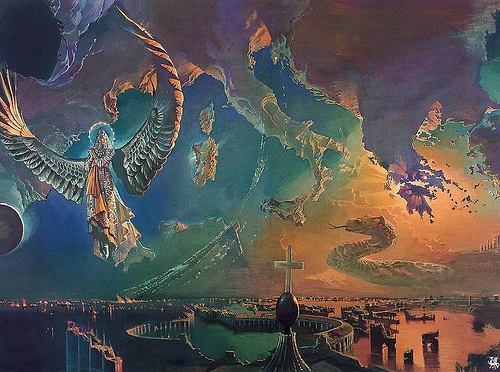We run our website the way we wished the whole internet worked: we provide high quality original content with no ads. We are funded solely by your direct support. Please consider supporting this project.

Do Angels and Demons Really Exist?
While the supremacy of God is never qualified in the Bible, this supremacy is not strictly autocratic. Other “gods” or spiritual entities like angels and demons are not mere puppets of the God of the Bible. Rather, they appear to be personal beings who not only take orders but also are invited to give input to their Sovereign (see 1 Kings 22:20; Is 6:8). They collectively constitute a type of “heavenly counsel.” These gods never rival the Creator’s authority. Thus they are never construed as major competing deities.
In sharp contrast to the Augustinian monopolizing view of divine sovereignty, the sovereign One in this concept invites and responds to input from both his divine and human subjects. The supplications and decisions of his creatures genuinely affect him, to the point where he may even altar previous plans in response to his creatures’ requests and behavior.
This notion that there exists a council, or a society, of divine beings between humans and God who, like us, have free wills and can therefore influence the flow of history for better or for worse, is obviously jarring to a number of Western worldview assumptions. Indeed, for many believers it is foreign to their Western Christian assumptions as well. For a variety of reasons, Westerners have trouble taking seriously the “world in between” us and God. Even when Westerners do theoretically acknowledge the existence of “angels,” we tend to view them as mindless, volitionless, wholly innocuous marionettes completely controlled by the will of their Creator.
If we take the biblical teaching on gods seriously, we must confess that our Western assumptions are erroneous. Indeed, the “heavenly” world largely overlaps our “earthly” world and can hardly be said to form two worlds at all. The “world in between” is, from a scriptural perspective, simply part of the cosmos.
This stands in contrast to the Greek metaphysical assumption which has shaped our Western worldview that the “heavenly” is composed of timeless “forms” that lack all contingency, a notion that exercised a profound influence on Christian theology and contributed to the church’s eventual abandonment of a warfare worldview.
In Scripture, as opposed to the dominant Hellenistic philosophical tradition that so influenced Augustine and other theologians of his day, there was nothing “heavenly” about being timeless, immutable, purely actual and devoid of contingency. There was nothing “perfect” about being an “Unmoved Mover” (Aristotle), and no sense could be made of saying that “time is the moving image of eternity” (Plato). Though it forms the cornerstone of the classical tradition of the Western church, no biblical author ever dreamed of such a notion.
The Bible depicts a “heavenly” world that parallels the “earthly” world, one where freedom and contingency in the “earthly” world has its counterparts in the counsel of heaven. The two worlds overlap and influence one another.
Because of our indebtedness to Greek thought through the classical view of God as well as our indebtedness to Enlightenment naturalism, modern Westerners have difficulty affirming the existence of—let alone the significant freedom and power of—this “world in between.” For these reasons many conservative theologians have difficulty positing genuine contingency in God himself.
But this theological tradition, more than anything else, is what creates the problem we have with explaining the nature of evil. In biblical terms, the evil experienced today—whether the beheading of martyrs or earthquakes—might be the result of evil human intentions. Or it might be due to a malicious “prince” over a part of the world, or some other cosmic power. None of these acts of evil could be an ordained feature of a secret blueprint God has for the whole world.
The character of God can remain untarnished in the face of the terrifying dimensions of our experience only to the degree that our view of the free, contingent world in between us and God is robust. Only to the extent that we unambiguously affirm that angels and humans have significant power to thwart God’s will and inflict suffering on others can we unambiguously affirm the goodness of God in the face of the evil being manifest in our world today.
-Adapted from God at War pages 130-141
Image by jslee_ via Flickr
Category: Q&A
Tags: Angels, Demons, Evil, Free Will, Spiritual Warfare, Warfare Worldview
Topics: Spiritual Warfare, Cosmic Conflict
Related Reading

Is Demon Possession Simply Psychological Catharsis?
Greg discusses demon possession and the believability of it. http://traffic.libsyn.com/askgregboyd/Episode_0151.mp3

4 Reasons to Wake Up to the Warfare Worldview
Image by postbear via Flickr A view of the world that grounds the problem of evil in spiritual warfare is not one that many modern people find easy to accept. To many contemporaries, the notion is preposterous that real, semi-autonomous, self-determining, and invisible spirits exist that can and do influence our lives. The whole thing sounds…

What To Do with the Bible’s Talk of Satan
Recently, Roger Olson raised the question on his blog about why Satan is ignored in modern theology. He observed how Greg’s theology takes an “obvious, ‘up front,’ blatant belief in a very personal, very real, very active Satan who has great power in the world.” Because we often have so little to say about Satan…

Podcast: Are We REALLY Free if God is Going to Ultimately Trump Our Choices?
Greg looks at the nature of freewill, specifically: how God’s promises constricts human free will. http://traffic.libsyn.com/askgregboyd/Episode_0070.mp3

God Does Not Always Get What He Wants
One of the ways the Bible makes it clear that humans have free will and that God doesn’t predetermine human decisions is found in the responses God has toward human choices. Scripture consistently depicts God as being frustrated by the way his people obstinately resist his plans and Scripture often depicts God’s heart as breaking…

Free Will: The origin of evil
In this continuing series on free will, Greg discusses how evil can only be accounted for if we acknowledge free will. This is especially true if you believe that God is good.
